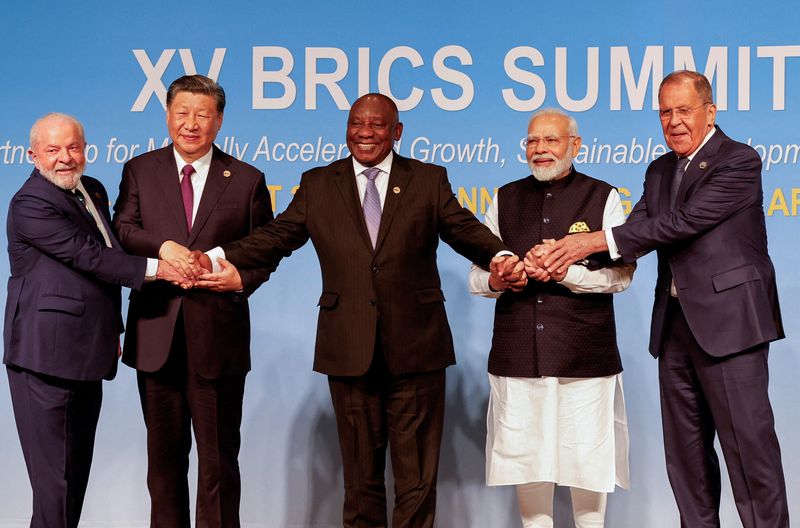By Mike Dolan
LONDON (Reuters) - In an investment world trumpeting new-found ethical and sustainability guidelines, the seeming indifference of markets to democratic credentials still remains stark.
As the BRICS grouping of developing economies this week planned expansion, a perennial question about whether democracy really matters in the choice of portfolio investment destination returns to the dashboard of global asset managers.
Although three of the current five BRICS - Brazil, Russia, India, China and South Africa - are functioning democracies, China dominates the coagulating bloc and the list of planned new members - Saudi Arabia, Iran, UAE, Egypt and Argentina - show democracy is low on the list of any entry criteria.
Designed more as a strategic counterweight to the G7-led developed world more than any cohesive economic structure, the group's political influence will have clout among emerging markets far and wide - and sharpen some investment thinking too.
Seasoned emerging markets investors have typically responded to ethical issues about the oft-dubbed "dictator trade" with a collective shrug, preferring to stress that risk and volatility come with the turf, global diversification is driver and returns are superior if well managed around hard-nosed metrics on growth, creditworthiness or resource wealth.
Communist China's rise to become the second-largest economy in the world, and near impossible to avoid in global investment terms, is the obvious cause celebre in that regard.
There's little doubt that emerging market risks are many and rising for Western investors.
The dangers of cross-border investment have skyrocketed this decade as the post-pandemic geopolitical fracture around Russia's invasion of Ukraine, China's ongoing claim on Taiwan and stinging Western sanctions and investment curbs up the ante.
Indeed investment returns in volatile broad indices of emerging market stocks, such as MSCI's benchmark, have been dire and the U.S. dollar is about 10% stronger in nominal terms against a basket of emerging currencies over the past 15 years.
For all its ups and downs in the interim, that MSCI equity index is still where it was in 2007 - while MSCI's all-country catchall index has doubled over the same period.
But questions about ethics and sustainability in investment have mushroomed over the past decade with a boom in demand for funds screened for environmental, social and governance (ESG) standards.
Democracy presumably fits into any "governance" consideration and should be a primary question for investors in emerging market sovereign debt - directly funding many autocratic governments rather than just the companies in their realm.
Russia's sanctioned debt wipeout since Ukraine aside, these bond indexes really have performed over time - with JP Morgan's EMBIG total return index of hard currency emerging sovereign debt almost doubling over 15 years, more in line with world stocks.
DEMOCRACY AND BELLIGERENCE
Boston-based fund manager GMO took up the issue in research this week, aiming to develop an emerging hard currency debt portfolio prioritising "freedom and democracy while preserving the key investment characteristics of the asset class."
To screen for democratic values per se, GMO strategists Eamon Aghdasi and Mina Tomovska used the World Bank's "Voice and Accountability" (V&A) scoring - capturing "the extent to which a country's citizens are able to participate in selecting their government, as well as freedom of expression, freedom of association and a free media."
While GMO acknowledged governance scores in general were lower for poorer countries than developed ones, regardless of the debate about the direction of causation, they claim the correlation between V&A scores and borrowing costs and bond spreads was "surprisingly weak" - much less than with other governance metrics such as corruption or regulation.
What's more, there were as many emerging economies in its sample with relatively low bond spreads in the group with very low V&A scores as the group with very high V&A scores.
"Relatively undemocratic countries with otherwise sound economic, fiscal, and governance characteristics can – and often do – earn the privilege of low borrowing costs," it said, adding Russia was a case in point before the Ukraine invasion - raising a reasonable question about whether risks that materialized there so clearly last year were fully appreciated.
But while the researchers admitted that screening out countries with poor overall governance, low credit ratings and high bond spreads merely reduced the performance of the portfolio, they said simply adjusting for V&A scores alone did lift returns significantly.
One problem with the latter, however, is that it's skewed by the Russia and Belarus shock over the past couple of years. If you removed those two wipeouts, screening just for V&A democratic values made much less difference to the bottom line.
"This brings us back to an inescapable question: Was democracy, or the lack thereof, really the issue that caused Belarus and Russia to fall off the map financially and produce such disastrous returns?" wrote Aghdasi and Tomovska, adding that while lack of democracy and belligerence were related, it would have been hard to predict or model the cascade of events.
Yet flipping the issue of indifference to democracy on its head, GMO concluded that their approach did show ESG and democracy-conscious investors could construct a portfolio they preferred "without significant sacrifices."
Of course sceptics might argue that just looking at emerging markets in relation to democratic risks may be inadequate in the light of the Jan. 6, 2001, events in Washington and subsequent trials.
What's more, analysing past returns may not fully capture the seismic geopolitical changes of the decade so far - where true risks to portfolios are underappreciated after 30 years of relative stability.
"The challenge for fund managers today is having an instinct for geopolitical risk when, in most cases, they haven't actually experienced it," Federated Hermes (NYSE:FHI) chief executive Saker Nusseibeh wrote in an op-ed in the Financial Times last week.
"Taking heed of these geopolitical risks could be the crucial difference between securing your returns or ending up with nothing."
The opinions expressed here are those of the author, a columnist for Reuters.
